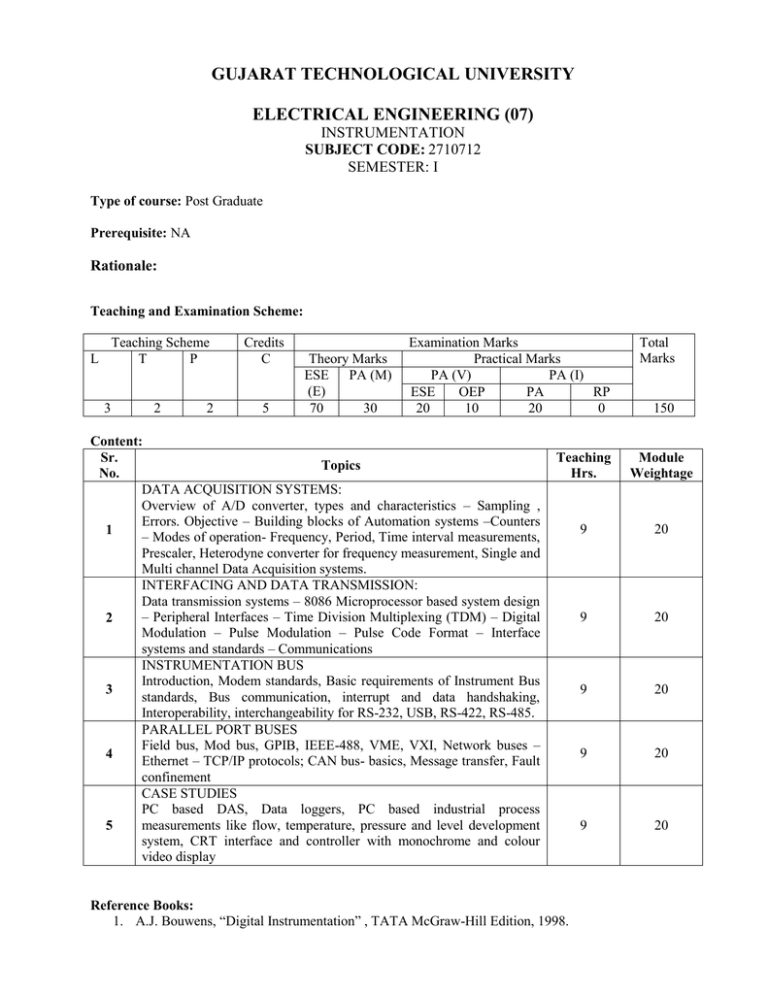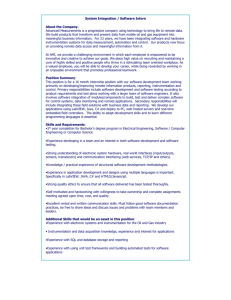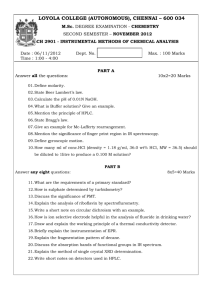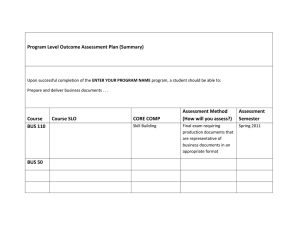2710712 - Gujarat Technological University
advertisement

GUJARAT TECHNOLOGICAL UNIVERSITY ELECTRICAL ENGINEERING (07) INSTRUMENTATION SUBJECT CODE: 2710712 SEMESTER: I Type of course: Post Graduate Prerequisite: NA Rationale: Teaching and Examination Scheme: L 3 Teaching Scheme T P Credits C 2 5 2 Theory Marks ESE PA (M) (E) 70 30 Examination Marks Practical Marks PA (V) PA (I) ESE OEP PA RP 20 10 20 0 Content: Sr. Topics No. DATA ACQUISITION SYSTEMS: Overview of A/D converter, types and characteristics – Sampling , Errors. Objective – Building blocks of Automation systems –Counters 1 – Modes of operation- Frequency, Period, Time interval measurements, Prescaler, Heterodyne converter for frequency measurement, Single and Multi channel Data Acquisition systems. INTERFACING AND DATA TRANSMISSION: Data transmission systems – 8086 Microprocessor based system design – Peripheral Interfaces – Time Division Multiplexing (TDM) – Digital 2 Modulation – Pulse Modulation – Pulse Code Format – Interface systems and standards – Communications INSTRUMENTATION BUS Introduction, Modem standards, Basic requirements of Instrument Bus 3 standards, Bus communication, interrupt and data handshaking, Interoperability, interchangeability for RS-232, USB, RS-422, RS-485. PARALLEL PORT BUSES Field bus, Mod bus, GPIB, IEEE-488, VME, VXI, Network buses – 4 Ethernet – TCP/IP protocols; CAN bus- basics, Message transfer, Fault confinement CASE STUDIES PC based DAS, Data loggers, PC based industrial process measurements like flow, temperature, pressure and level development 5 system, CRT interface and controller with monochrome and colour video display Total Marks 150 Teaching Hrs. Module Weightage 9 20 9 20 9 20 9 20 9 20 Reference Books: 1. A.J. Bouwens, “Digital Instrumentation” , TATA McGraw-Hill Edition, 1998. 2. H S Kalsi, “Electronic Instrumentation” Second Edition, Tata Mc GrawHill 2006. 3. Joseph J. Carr, “Elements of Electronic Instrumentation and Measurement” Third Edition, Pearson Education, 2003. 4. Buchanan, “Computer busses”, Arnold, London, 2000. 5. Jonathan W Valvano, “Embedded Microcomputer systems”, Asia Pvt. Ltd., Brooks/Cole, Thomson, 2001. 6. S. K. Singh, “Industrial Instrumentation and Control”, TATA McGraw-Hill. 2004 7. N. Mathivanan, “PC-Based Instrumentation”, PHI, 2009 Course Outcome: After learning the course the students should be able to 1. Use A/D and D/A convertors and Data Acquisition System 2. Understand the different communication protocols 3. Carry out interfacing using USB ports and different networks medium 4. Carry out the industrial application . List of Experiments: 1. 2. 3. 4. 5. 6. 7. To study the A/D and D/A convertors and it’s characteristics To study the Data Acquisition System To study Interfacing of DC motor with microprocessor and microcontrollers To study the modulation technique Read the sensor data using RS-232, USB, RS-422, RS-485 To study the characteristics of Ethernet, Field bus and CAN bus Case study of various industrial instrumentation applications a. Temperature measurement b. Flow measurement c. Speed measurement Open Ended Problem: To design a Multiple Sensors Data Monitoring Networked System with Open Source Tool using DAQ system and Arduino Due board. List of Open Source Software/learning website: http://nptel.iitm.ac.in/coursecontents_elec.php ocw.mit.edu/courses/electrical.../6-334-power-electronics-spring-2007



